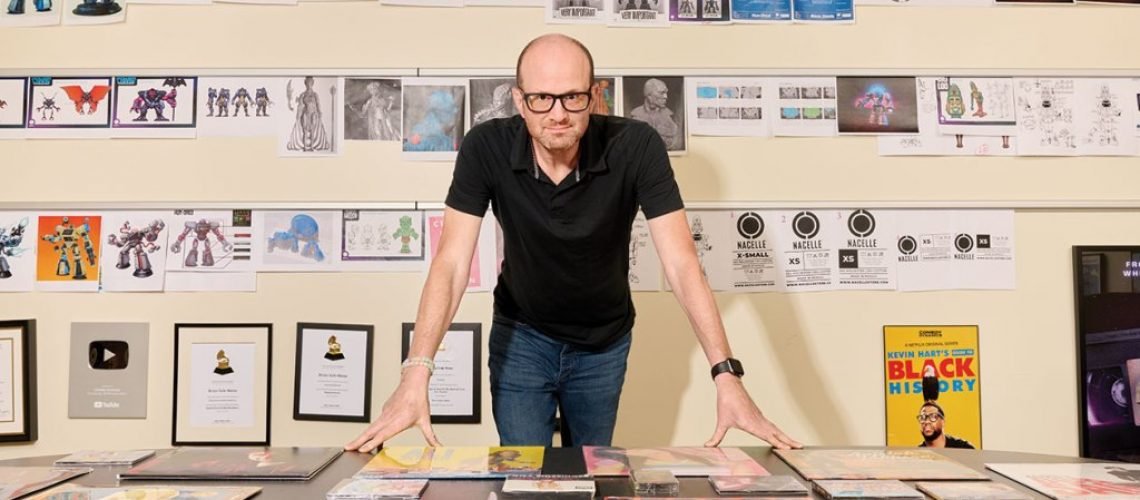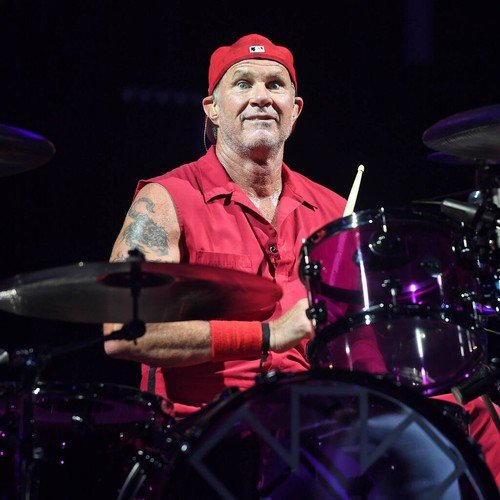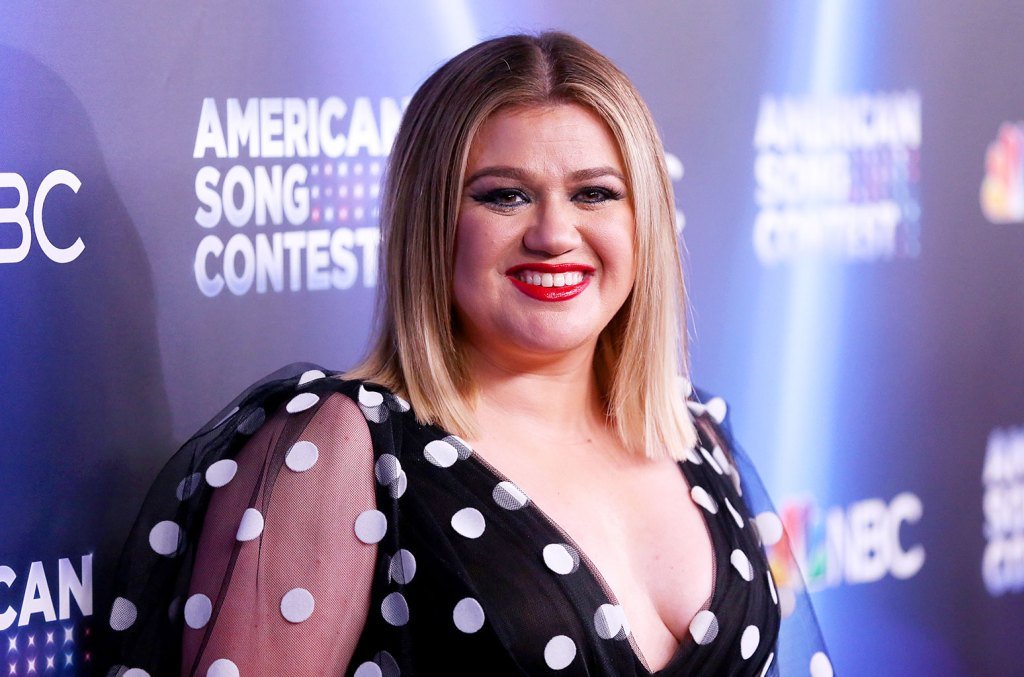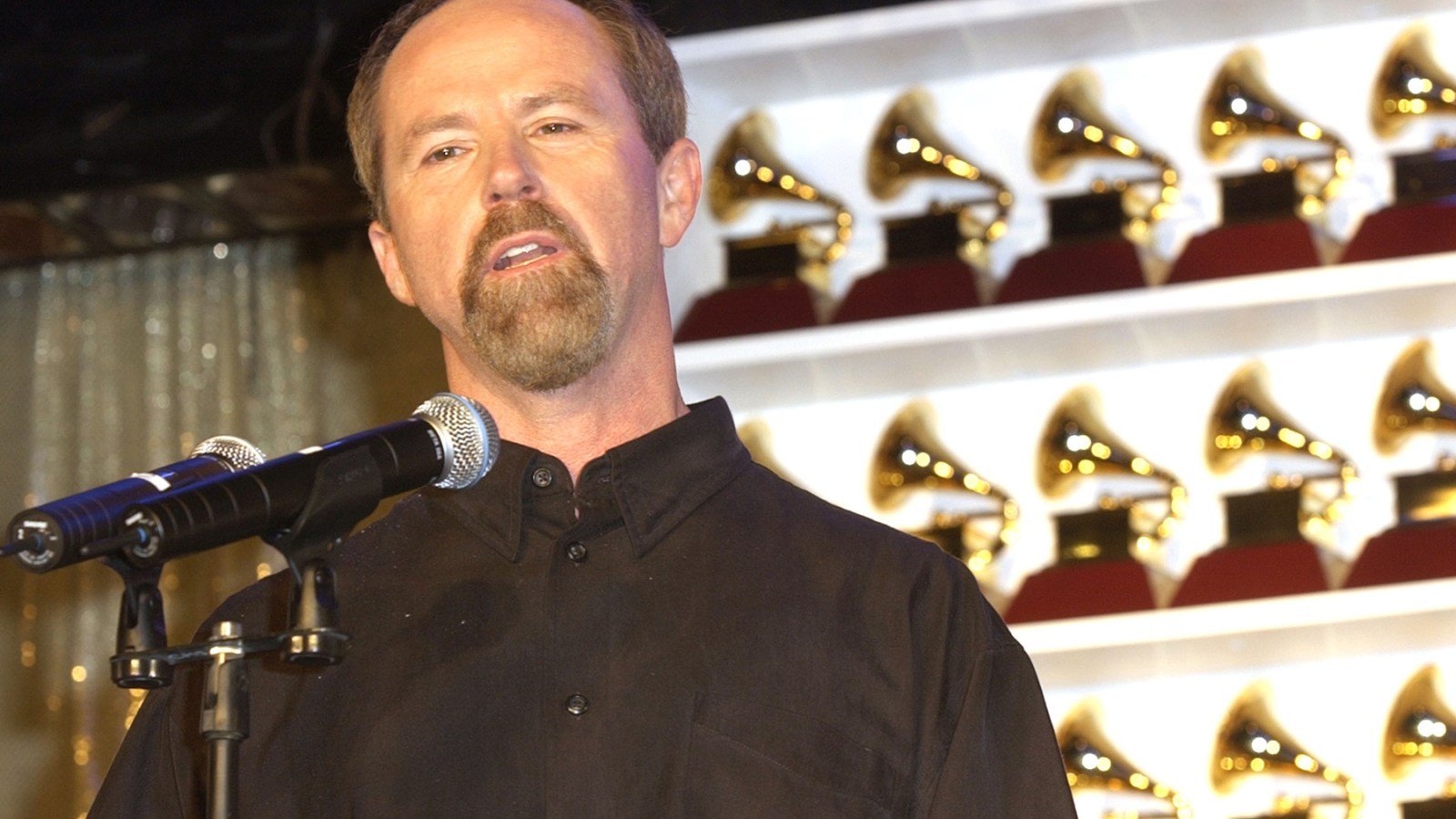When it comes to the business of stand-up comedy, the process usually goes something like this: A comedian spends a year to 18 months building an hourlong set, sharpening jokes that work and tossing the ones that don’t. Once the set is perfected, a special is filmed and sold to Netflix or another streaming service.
For Comedy Dynamics founder/CEO Brian Volk-Weiss, that’s just half the equation. The company’s record label — which he says releases over 150 comedy albums every year in digital streaming and physical formats — accounts for approximately 50% of annual revenue. That means vinyl is every bit as important to his bottom line as it is to any music company.
The 46-year-old Queens native — who could pass for a lankier, more animated version of Moby — has built a multimedia empire by following his instincts and immersing himself in the histories of his “hobbies,” as he calls them. And his instincts told him that the delays with the already crammed vinyl pipeline would only get worse with the pandemic, so he pushed his chips into the center of the table. “The deals we did were a little bit risky because we had to guarantee volume to get priority,” he explains. But that volume has meant the turnaround time for Comedy Dynamics vinyl releases is about six to eight months. “The best-case scenario for the industry right now is 14 months, but I think it’s closer to 18.”

A collection of Comedy Dynamics albums and box sets. “I think physical will be 10% to 12% of our revenue this year,” Volk-Weiss predicts.
Yasara Gunawardena
Comedy Dynamics, which bills itself as the largest independent comedy production and distribution company, evolved from Volk-Weiss’ work managing comedians, including Dane Cook, Whitney Cummings and Jeff Ross. In 2019, it made Grammy Award history when its releases swept all five of the nominations for comedy album of the year. (All told, 21 have been nominated and four have won.) Five years ago, Volk-Weiss founded the Nacelle Company — now the parent company of Comedy Dynamics — to expand into publishing, podcasts, and scripted and unscripted productions, such as the Netflix series The Toys That Made Us. (Speaking of hobbies, his toy collection numbers approximately 3,300.) That led to Nacelle entering the business of collectible toy making, and the walls of Volk-Weiss’ Burbank, Calif., office are lined with drawings, schematics and photos of recent and future releases. He even has a Legends of Laughter line of stand-up comic action figures.
But the audio side of the comedy business was the focus when Volk-Weiss sat down with Billboard: what the music industry might learn from it and his take on the push by collection societies Word Collections and Spoken Giants to get comics paid royalties for the jokes they write and not just for their performance of them.
Stand-up comedy arguably works best when a comedian can be seen, whether live or on a streaming special. Given the volume of specials you release annually, why do you need a record label?
A couple of reasons: First, based on the listening, renting and buying numbers we see in North America, England, South Africa and other countries, the people want it. We typically have between 200% and 400% growth year over year. Second, it makes a lot of money, and that money finances all the other stuff we’re doing. We’ve moved into books, toys, podcasts, a scripted feature film. Don’t get me wrong — the video finances a tremendous amount of that as well. But the cash flow from the record label is tremendous, too.
How tremendous?
Very high seven, low eight figures — and growing. As you know, physical — vinyl and even CDs — is growing. Five years ago, physical would have been 5% of our revenue. I think it will be 10% to 12% this year. We did one all-vinyl record deal this year with a major lifestyle chain store. That one deal was more physical product than we sold in all of 2018.
What size was the order?
A 60,000-piece order. They have hundreds of stores. And overall, we sell hundreds of thousands of vinyl albums a year. This chain ordered two titles from us in 2020. We told them one was a smart pick and one was a stupid pick — the data we have is insane. Blue state, red state, Black people, white people, old, young — it’s that granular. This company saw the data and they ignored us, but we were so specific and so correct that they placed this massive order with us this year and said, “We want 10 titles. You pick them.”
Are you generating this data in-house or outsourcing?
We get data from the places that monetize our content and plug it into software that we hired a computer coder to build.
What percentage of Comedy Dynamics’ revenue does the label bring in?
For Comedy Dynamics, about 50%. For Nacelle, it will be about 8% this year and next. You need enough hits that are expected, and you need enough unexpected hits. We put out a great album last year.

Prototypes of Maxx Steele (left) and Wrecker from the Nacelle Company’s Robo Force line of collectible toys.
Yasara Gunawardena
Who’s the comedian?
Because I’m talking money, I don’t want to reveal her name. She had just 12,000 followers on Instagram and wasn’t on Twitter. Our business model is almost all based on referrals from comedians, agents, managers. This comedian was recommended by another comedian I trust. We did the deal. We paid her $5,000 upfront. It cost a couple of grand to do all the stuff we do to put it out: artwork, yada, yada, yada. Our all-in was slightly less than $10,000. I would have jumped over the moon if it had broken even in the first 12 months. But she had a joke in the middle of the special — a 40-second piece — that took off. Something like 80,000 YouTube streams within a week. The album made about $43,000 in the first eight months. People hear 40 seconds of genius, and then they want to listen to the album.
Besides an advance, what else does the comedian get from a deal made with Comedy Dynamics?
Cradle-to-grave love for the album and back end. Once it breaks even, they’ll make money for the rest of their lives. The money is coming in from everywhere — we just did a deal with one of the biggest airlines in the world. So we get a billionth of a penny from everywhere, every day. It all gets put in a pot that gets divided with the artist.
What’s their cut?
Every deal is different, but we never go below 33%.
The recorded comedy business seems to work in reverse of the recorded music business. With music, everything starts with the song or album — that launches the tour and you can buy the record at the merch table. With comedy, the album is the last thing that happens. The artist spends 18 months building an act, does a special and then the album becomes available. What can the music business learn from how you do business?
For at least 15 years, I’ve been saying, you don’t have to be like, hey, I’m going to hire a producer, and we’re going to a chateau in France to work out the album together. And then we’re going into a studio for two weeks to make it perfect. That seems insane to me because you’re not testing the music. If you’re lucky you’ve got a manager with good taste, maybe an agent, maybe a label, the producer — say eight or nine guts giving you feedback. I have never understood why music artists don’t practice with the public. I lived in Ireland during my sophomore year in college and worked at a pizza place that had this bouncer — the toughest motherfucker. I saw him throw a guy through the restaurant’s window once. Anyway, the guy never spoke – ever. One day, my shift is over, I’m walking out, and he goes, “Temple Bar. Midnight.” It was like the Pepsi machine spoke to me. It’s a small bar and some shitty band is onstage. Well, right after midnight, U2 takes the stage with, like, 15 people in the room, and they did a three-hour jam. I would conservatively estimate that 30 percent of their set was new. They would finish a song, and Bono would literally say, “What’d you think?” So, I’ve had that in my mind since I was 20, and I’ve never understood why more artists don’t do that. I’m the biggest Lady Gaga fan. It blows my mind that she can do what she does without that process because, especially when I was a manager, I would see what the most brilliant joke of all time sounded like 18 months earlier. A comedian would do a shitty joke about losing their car keys and then 18 months later you’re shooting the special and you’re like, that’s from that.
We recently published a story about how songwriters, producers and even artists are having a hard time with labels testing songs on TikTok. If the song doesn’t go viral, it’s scrapped.
That’s insane. If you can find episodes of Jimmy Kimmel’s late-night show from the first two years that he was on ABC, it’s unwatchable. The reason he didn’t get canceled was because he was tight with [then-Walt Disney Company chairman/CEO] Michael Eisner, and Eisner protected him long enough to become what he is now, which is one of the greatest talk-show hosts. Sometimes it takes time to connect. To not release a song because it didn’t do well on TikTok is horrible. That’s what leads to homogenization.
In February, five comedians, including the estates of George Carlin and Robin Williams — all clients of the collection agency Word Collections — sued SiriusXM-owned Pandora for not paying the equivalent of music publishing royalties to use their works. Spotify has also come under fire. Where do you stand on this issue?
Our contracts say that we own the publishing. To the best of my knowledge, no other contract in stand-up has that language, so we are protected.
Now, I’m a big history buff, and everything we’re talking about today — the lifeblood of this company, the cash flow that comes in — goes back at least 100 years to the sale of sheet music in London. ASCAP, BMI and SoundExchange, they are all the great-great-great grandchildren of the sheet music business in London. What I also know is that every 10 to 15 years, somebody says, “I found the way to squeeze out another nickel.”
I look at this in two different ways. No. 1, because of how much time I spent as a manager, I want the artists to make as much money as possible. When I first heard about this, I was like, “All right, it has been 10 years — time to shake the couch again and look for the pennies.” And it is pennies.
I’ve seen estimates that $1.5 billion in royalties haven’t been collected.
We’ll get to that. As I said, I’m happy if artists are making more money because, for one thing, it’s their genius that people are listening to. On the other hand, here’s what nobody talks about: How much does it cost to design a satellite that needs to remain in orbit for eight to 10 years? How much does it cost to get it up into orbit? How many people know that for Sirius and Pandora and all these companies to do what they do requires a minimum of 12 fully functioning satellites and three spares? And that’s just for 80% of global penetration. If you want to cover the world — which Sirius does — you need 24 satellites and, I think, six spares. Satellites are about $20 million a pop; to get one into orbit is about $100 million.

A Star Wars Death Star cookie jar and a “wood thing” that Volk-Weiss says was “the first fan-made anything” created for Comedy Dynamics.
Yasara Gunawardena
So do you support these comedians’ lawsuits?
I support anything that will make artists more money. If they can find a way to make it work for everybody, where the artists can make more money and the providers can continue to launch those satellites into orbit, great. If Sirius goes out of business because they can’t afford to pop satellites up anymore, what could be worse for comedians?
You were saying that the $1.5 billion in uncollected royalties is really about pennies.
If there is anything that annoys me about what [Word Collections and Spoken Giants] are doing, it’s that they’re talking about how they’ve discovered this new thing. We’ve been collecting this type of money for at least four years. So let’s talk about that $1.5 billion: My main problem with this whole topic is you have all these comedians out there who are like, “Woo! We got another SoundExchange coming.” They don’t. And let’s say, hypothetically, it is $1.5 billion a year. That money is getting divided up by a bare minimum of 10,000 comedians, but it’s skewed to performance. I guarantee you the top 10% of comedians — the Kevin Harts, the Ali Wongs, the Jim Gaffigans — will get $1.3 billion of that total.
Dave Chappelle stirred up quite a bit of controversy this year with his jokes about transgender people. What is your take on cancel culture?
I think it’s horrible. I think that every individual has a right to make their own decision, and if you try to force your opinion on other people, you’re becoming what you hate. You know how you get Louis C.K. to stop doing comedy? You don’t go to his show and other people don’t go to his show. There are comedians who have been canceled organically, and they ain’t coming back because the public decided they’re disgusting, and no one pays to see their show. I’m not going to say his name, but there was a comedian that was selling 3,000 to 8,000 tickets a night before he got — I don’t like the term that we use for this so I’m not going to use it. But a lot of women came out and said he did horrible things, and he kind of didn’t deny it. So, it wasn’t a he said-she said situation. It was eight women at least and most of them were comedians. Three of them I know super-duper well. These women —on Twitter, on TikTok, whatever — were like, this guy sucks. Here’s what he did to me. This guy can’t sell 200 tickets. That’s fair. America has spoken.
Over the past few months, Chris Rock was slapped onstage at the Academy Awards, and Chappelle was attacked during a live performance. How much does that worry you?
It worries me. To be a comedian — I don’t care if you’re Chris Rock and you’ve been doing this for 40 years — you are so vulnerable up there. Because at the end of the day, if you’ve done 999 shows and the joke always works, you know damn well this could be the show where it doesn’t. Nine out of 10 comics get some degree of butterflies before they go onstage. And now they have to worry about knives? Or getting punched in the face when the whole world is watching? This is Mad Max stuff — that’s how horrible it is.
Are comedians you know taking precautions?
Yeah, they are. I’m going to leave it at that.
This story originally appeared in the June 25, 2022, issue of Billboard.




